The Role of Parenteral Nutrition in Managing Inflammatory Bowel Disease (IBD)
Introduction to Nutritional Support in IBD
Inflammatory bowel disease (IBD), comprising Crohn's disease and ulcerative colitis, significantly impacts nutritional status due to malabsorption, increased metabolic demands, and disease-related anorexia. Nutritional support plays a vital role in managing these patients, not only to address malnutrition but also to potentially influence disease activity and surgical outcomes. Among various nutritional interventions, parenteral nutrition (PN), particularly total parenteral nutrition (TPN), has gained prominence as a supportive therapy in specific clinical scenarios. This article explores the multifaceted role of PN in IBD management, its applications in pediatric and adult populations, safety considerations, and its integration into comprehensive treatment strategies.
The Fundamental Role of Parenteral Nutrition in IBD
What is the role of parenteral nutrition in the management of inflammatory bowel disease (IBD)?
Parenteral nutrition (PN) is a vital supportive therapy used in managing patients with inflammatory bowel disease (IBD), especially when oral or enteral routes are compromised. It involves administering a nutritious liquid directly into the bloodstream, bypassing the damaged gastrointestinal tract.
In IBD, PN is particularly employed when patients suffer from severe disease activity, bowel obstructions, high-output fistulas, or during postoperative recovery, where gastrointestinal function is limited or the gut cannot absorb nutrients effectively.
One of the major benefits of PN is its ability to restore and maintain nutritional status. It can improve serum albumin levels, which are often low in malnourished IBD patients, and help correct micronutrient deficiencies.
Additionally, PN contributes to bowel rest, decreasing mucosal antigen exposure, which may indirectly influence disease activity. Some studies report improvements in inflammatory indices such as the Crohn's Disease Activity Index (CDAI) with PN, although this effect may be modest.
However, evidence from meta-analyses suggests that PN does not significantly increase body weight, indicating its primary role as a supportive rather than a direct disease-modifying treatment.
Ultimately, PN’s role is complementary, particularly tailored within a multidisciplinary framework that includes nutritional, medical, and surgical strategies, to optimize patient outcomes.
Impact of PN on disease activity and nutritional status
While PN can improve nutritional markers and potentially enhance disease activity scores in Crohn's disease, its capacity to induce long-term remission is limited. It is mainly beneficial for short-term nutritional support, especially in severely malnourished patients.
In children with Crohn's disease, long-term PN combined with bowel rest has shown to induce temporary remission or marked improvement. Nonetheless, most pediatric cases experience Recurrence within a year, often requiring surgery.
In ulcerative colitis, the efficacy of PN is less pronounced, mainly serving to correct nutritional deficiencies rather than modifying the inflammatory process.
Furthermore, PN helps improve bowel motility, intestinal permeability, and overall nutritional state, which are crucial in managing active disease phases.
PN as part of multidisciplinary care
Effective management of IBD with PN necessitates a coordinated approach involving gastroenterologists, nutritionists, surgeons, and nursing staff. Monitoring for complications such as infections, liver issues, and electrolyte imbalances is crucial.
Using PN appropriately, with careful patient selection and ongoing assessment, can reduce postoperative complications, support healing, and prepare patients for surgery when needed.
Most patients tolerate cycle-fed PN (administered for 10-12 hours at night), which facilitates mobility and compliance.
In sum, while not a cure, PN is an essential component of comprehensive care in selected IBD cases, helping bridge nutritional gaps and supporting recovery during critical disease phases.
Efficacy and Outcomes of Total Parenteral Nutrition
How effective is total parenteral nutrition (TPN) in treating inflammatory bowel disease?
Total parenteral nutrition (TPN) plays a significant role as an adjunct therapy for patients with inflammatory bowel disease (IBD), especially those with severe malnutrition, bowel obstructions, or refractory disease. It provides liquid nutrients directly into the bloodstream, bypassing the damaged or unusable parts of the gastrointestinal tract.
In the short term, TPN can lead to notable clinical improvements. Many patients experience weight gain, resolution of diarrhea, relief from abdominal pain, and an overall sense of well-being. Such benefits are particularly evident in Crohn's disease patients requiring bowel rest before surgery or during acute exacerbations.
However, the long-term impact of TPN on disease remission is limited. Most studies report a high relapse rate within a year of discontinuing TPN, especially in Crohn's disease. Some children with Crohn's who respond to TPN may initially improve, but recurrence often occurs within 12 months, ultimately necessitating surgery or escalation of medication.
The effects on body weight are mixed. While most patients do gain weight during treatment, TPN alone does not significantly change overall disease progression or modify the inflammatory markers over an extended period.
Despite its benefits, TPN is associated with risks such as infections, liver complications, and metabolic disturbances. Therefore, it is reserved for specific indications like severe malnutrition, fistulas, short bowel syndrome, or preoperative optimization. Long-term TPN requires meticulous management by specialized teams to minimize adverse effects.
In summary, TPN can provide vital nutritional support and temporary clinical flare relief, but it is not a definitive treatment for IBD. Its use is usually limited to particular situations, with the primary goals being nutritional replenishment and preparation for surgical procedures.
Indications, Benefits, and Limitations of Parenteral Nutrition in IBD
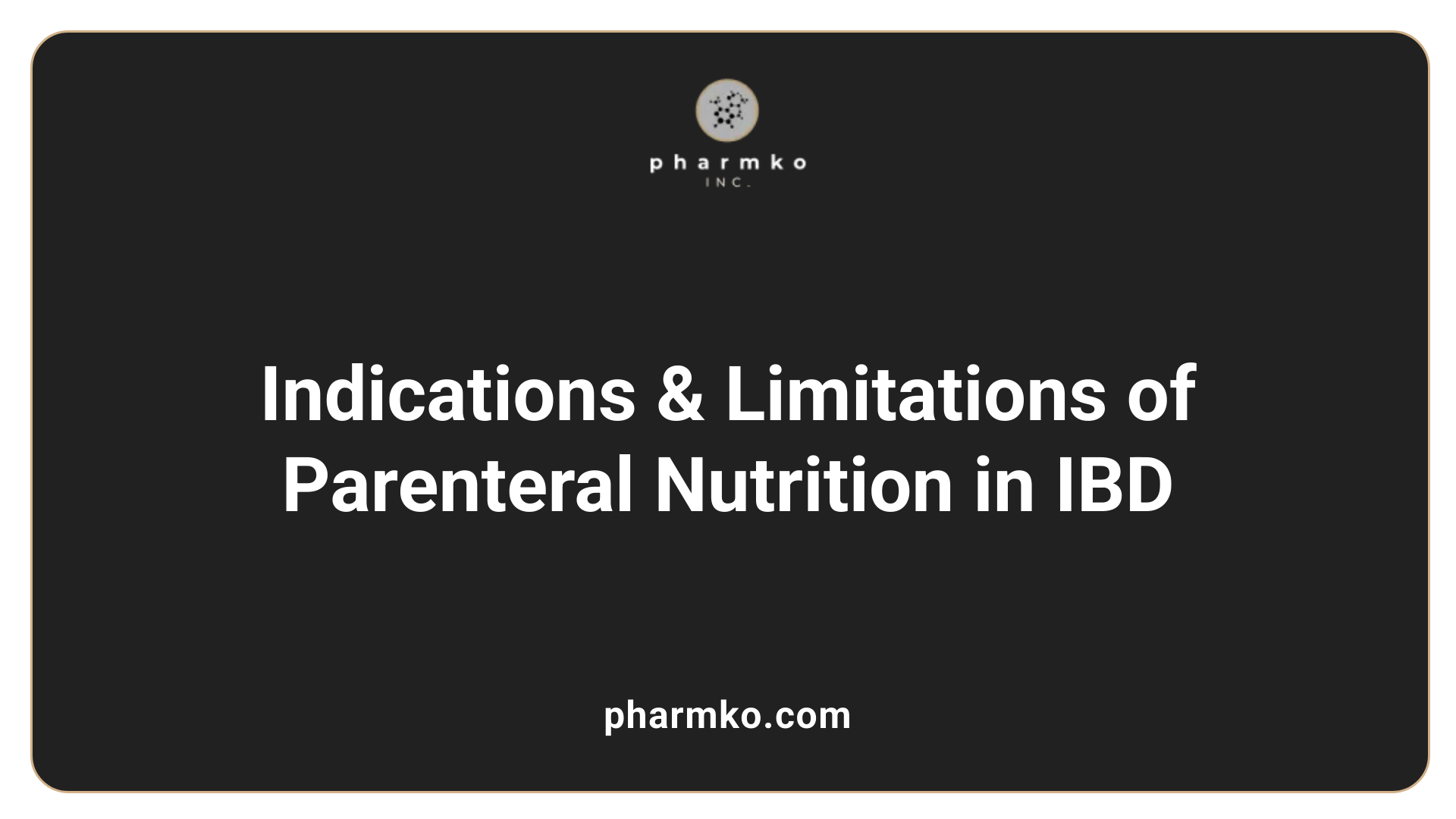 Parenteral nutrition (PN), particularly total parenteral nutrition (TPN), plays a crucial role in managing patients with inflammatory bowel disease (IBD) who face severe nutritional challenges. It is mainly indicated when oral or enteral nutrition cannot meet patient needs due to complications such as bowel obstructions, high-output fistulas, or intolerance to enteral feeding.
Parenteral nutrition (PN), particularly total parenteral nutrition (TPN), plays a crucial role in managing patients with inflammatory bowel disease (IBD) who face severe nutritional challenges. It is mainly indicated when oral or enteral nutrition cannot meet patient needs due to complications such as bowel obstructions, high-output fistulas, or intolerance to enteral feeding.
The main benefits of PN include correcting malnutrition, which is common in IBD with up to 85% of hospitalized patients experiencing protein-energy deficiencies. It helps restore body weight, supports wound healing, and improves disease activity indices like the Crohn’s Disease Activity Index (CDAI). Additionally, PN can enhance serum albumin levels and overall nutritional status, thereby reducing the risk of postoperative complications, especially in severely malnourished patients preparing for surgery.
Despite its advantages, PN has notable limitations and potential risks. Main concerns involve catheter-related bloodstream infections and thrombosis, which require meticulous monitoring and care. Long-term use of PN can also lead to complications such as liver dysfunction, osteoporosis, and nutrient imbalances, making it unsuitable as a routine therapy. It is less physiologic compared to enteral nutrition (EN) and does not significantly influence remission rates or disease progression in Crohn’s disease.
Overall, PN should be tailored to individual patient needs, often as a temporary measure or bridge therapy. Guidelines from organizations like ESPEN emphasize its use when EN is ineffective or contraindicated. Proper management involves a multidisciplinary team, careful monitoring of electrolytes and liver function, and gradual weaning once oral or enteral nutrition becomes feasible. While not a cure for IBD, PN is a lifesaving intervention that optimizes nutritional status, supports recovery, and minimizes complications in specific clinical scenarios.
Application of Parenteral Nutrition in Pediatric and Adult IBD Populations
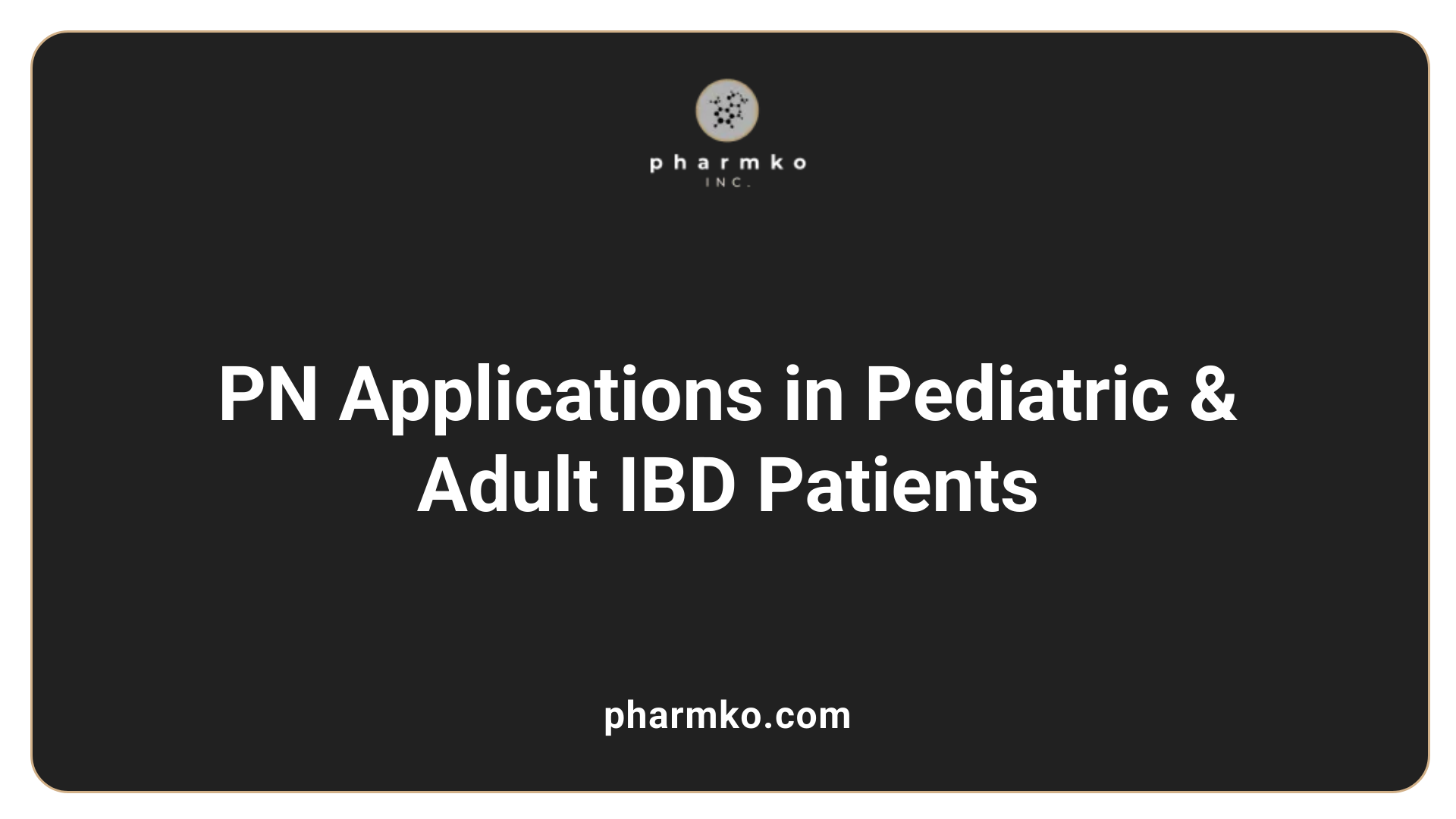
How is parenteral nutrition applied in pediatric and adult IBD populations?
Parenteral nutrition (PN) plays a vital role in managing Crohn's disease and ulcerative colitis cases where the gastrointestinal tract cannot be used effectively for feeding.
In children with IBD, especially Crohn's disease, PN is often employed when the disease activity is severe and enteral nutrition cannot be maintained due to obstruction, fistulas, or intolerance. It supports growth, corrects nutritional deficiencies, and can promote remission temporarily. While PN helps in nutritional repletion, it is usually part of comprehensive care that includes medication and dietary management.
Adult IBD patients also utilize PN under specific circumstances. Typically, it is reserved for cases involving significant malnutrition, intestinal failure, or postoperative recovery. For example, in cases of bowel obstruction, short bowel syndrome, or high-output fistulas where enteral feeding is either impossible or insufficient, PN ensures the delivery of essential nutrients.
The primary goals of PN in both populations include restoring nutritional status, supporting mucosal healing, and reducing systemic inflammation. It acts as an adjunct to medical therapies, ensuring patients maintain weight, prevent deficiencies in vitamins and minerals, and improve overall outcomes.
In summary, PN application is tailored based on disease severity and patient needs, with a focus on supporting nutrition, facilitating recovery, and preventing complications associated with malnutrition in IBD.
Guidelines and Evidence Supporting Nutritional Interventions in IBD
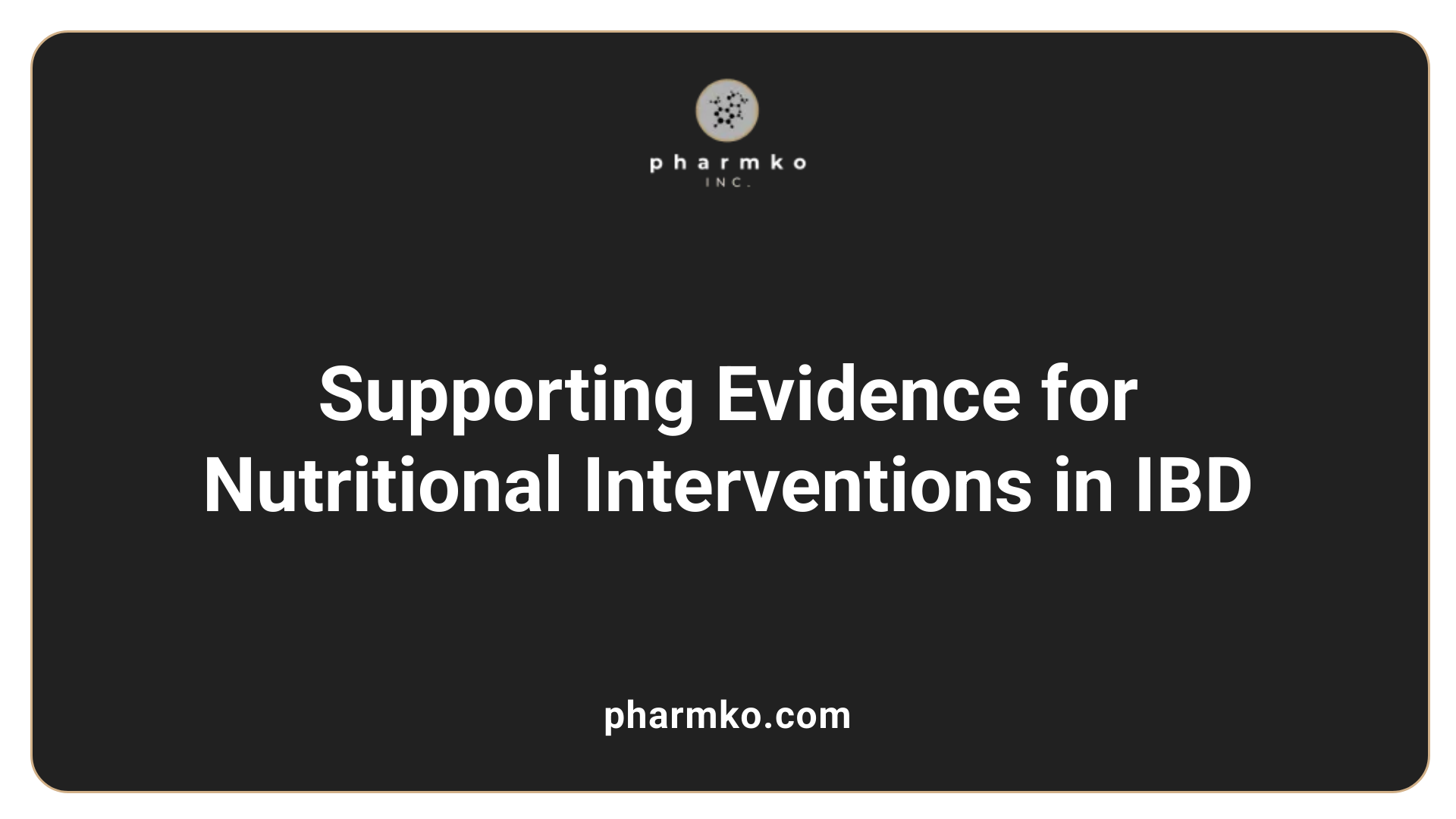 Professional guidelines and research support the strategic use of nutritional therapies, including parenteral nutrition (PN), in managing inflammatory bowel disease (IBD). The European Society for Clinical Nutrition and Metabolism (ESPEN) provides specific indications for PN, emphasizing its role in cases where enteral nutrition (EN) cannot meet nutritional needs, such as with intestinal obstructions, fistulas, or severe malnutrition.
Professional guidelines and research support the strategic use of nutritional therapies, including parenteral nutrition (PN), in managing inflammatory bowel disease (IBD). The European Society for Clinical Nutrition and Metabolism (ESPEN) provides specific indications for PN, emphasizing its role in cases where enteral nutrition (EN) cannot meet nutritional needs, such as with intestinal obstructions, fistulas, or severe malnutrition.
Evidence from multiple studies suggests that PN can positively influence clinical outcomes in IBD. For instance, it has been shown to improve the Crohn's Disease Activity Index (CDAI) and serum albumin levels, which are markers of disease activity and nutritional status. These improvements are particularly relevant in patients with Crohn's disease experiencing malnutrition or during severe disease flares.
In clinical practice, PN is especially valuable preoperatively in patients with intra-abdominal abscesses, phlegmonous inflammation, or high-output fistulas, as it helps reduce inflammation and optimizes surgical recovery. It allows bowel rest, provides essential nutrients, and removes antigenic stimuli from the mucosa.
Despite its benefits, the evidence for long-term PN use remains limited, and its risks such as infections and liver complications necessitate careful monitoring. Therefore, PN is generally considered a temporary, supportive measure rather than a primary treatment for disease remission.
Current guidelines recommend transitioning from PN to oral or enteral nutrition once the patient’s condition stabilizes. The ultimate goal is to minimize dependence on PN, reduce associated complications, and support the patient’s nutritional and clinical recovery.
While evidence strongly supports PN's use in specific scenarios, there is a need for further high-quality studies, particularly regarding its long-term benefits in ulcerative colitis and its impact on disease progression. Continued research will help clarify the optimal integration of nutritional therapy into comprehensive IBD management protocols.
Parenteral Nutrition within Overall IBD Treatment Strategies
Supportive Role of Parenteral Nutrition
Parenteral nutrition (PN), especially total parenteral nutrition (TPN), serves as a vital supportive element in managing inflammatory bowel disease (IBD). It is primarily used when patients cannot tolerate sufficient oral or enteral intake, such as in cases of severe disease, bowel obstructions, fistulas, or intestinal failure. In these situations, PN helps address profound malnutrition, restoring nutritional levels, and supporting wound healing.
Integration with Medical and Surgical Therapy
PN complements other therapeutic approaches by stabilizing nutritional deficiencies, which are common in IBD patients—up to 85% of hospitalized individuals experience protein-energy malnutrition. Improving nutritional status before surgery can reduce postoperative complications, including infections and wound healing issues. Though PN does not directly induce remission, it supports disease management alongside medications like corticosteroids or immunosuppressants.
In surgical contexts, preoperative PN improves patient resilience, especially in malnourished individuals, lowering the risk of complications. Postoperative use of PN may also assist in recovery, particularly when oral or enteral intake remains inadequate. However, PN is not a substitute for primary disease-directed therapies, which include pharmacological and surgical interventions, but a supportive measure to optimize overall outcomes.
Multidisciplinary Approach
Optimal use of PN in IBD requires a team-based, multidisciplinary approach. This team typically includes gastroenterologists, surgeons, dietitians, nursing staff, and pharmacists. This collaboration ensures careful monitoring for complications such as infections, liver problems, electrolyte imbalances, and metabolic disturbances. Regular laboratory assessments of electrolytes, liver enzymes, and body weight are essential.
Moreover, choosing the right composition of PN—higher protein content, balanced glucose, and micronutrient supplementation—is tailored to each patient's needs. Monitoring and adjusting therapy are crucial, especially for long-term TPN, which may be required in cases like short bowel syndrome. Psychological support and patient education are also fundamental, as long-term TPN management can be challenging, emphasizing the importance of an organized, comprehensive approach.
In summary, parenteral nutrition is a supportive therapy that plays a crucial role in the holistic management of IBD, aimed at improving nutritional status, reducing perioperative risks, and maintaining or restoring health during disease flares and complications.
Risks and Management of Parenteral Nutrition in IBD
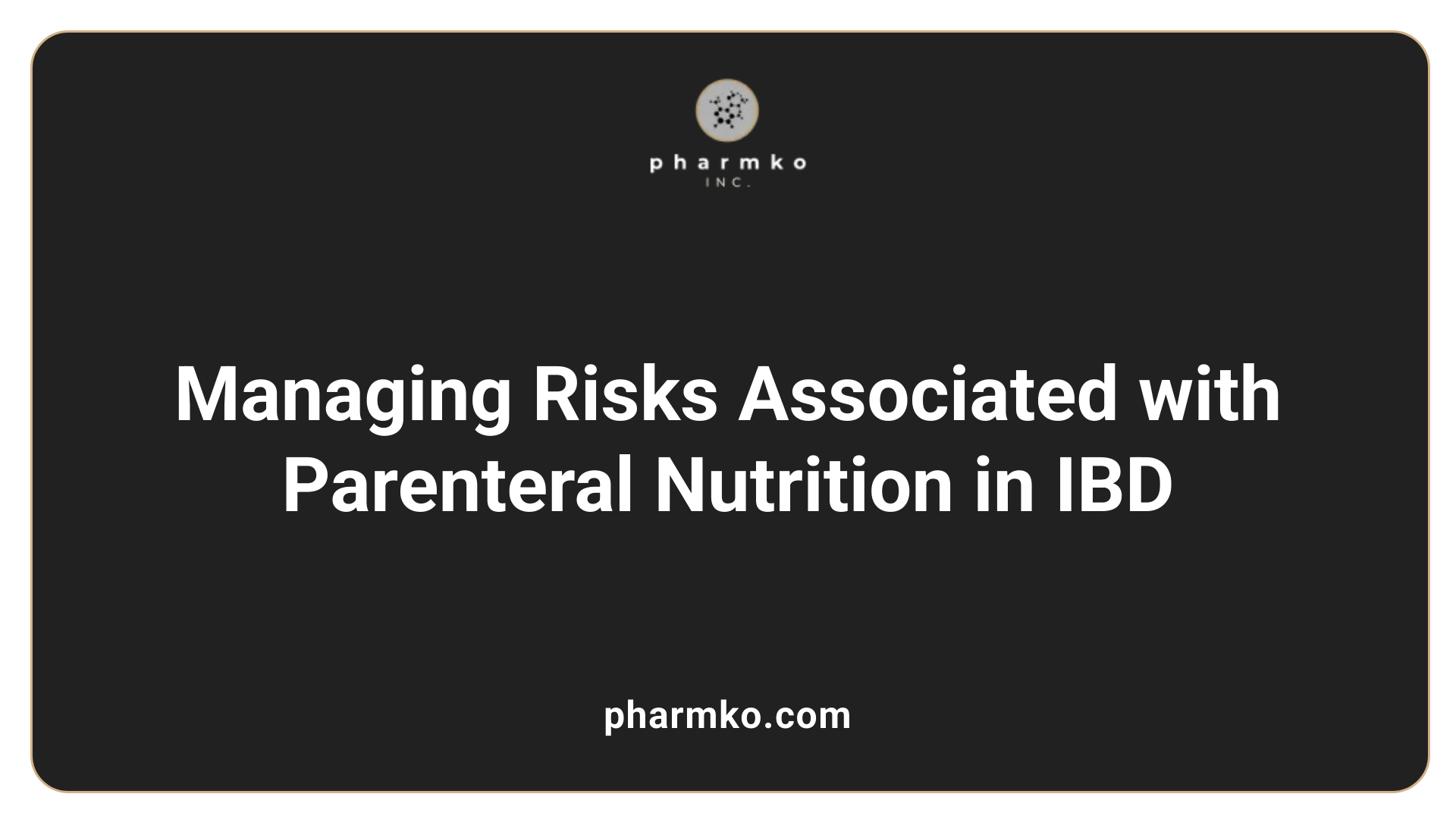 Parenteral nutrition (PN) is a valuable treatment option for certain patients with inflammatory bowel disease (IBD), but it carries specific risks that require careful management. The most significant complications include infections, particularly bloodstream infections or sepsis related to central venous catheters. Thrombosis of the catheter or associated vessels can also occur, posing additional risks.
Parenteral nutrition (PN) is a valuable treatment option for certain patients with inflammatory bowel disease (IBD), but it carries specific risks that require careful management. The most significant complications include infections, particularly bloodstream infections or sepsis related to central venous catheters. Thrombosis of the catheter or associated vessels can also occur, posing additional risks.
Electrolyte imbalances and metabolic disturbances like hyperglycemia are common concerns, especially in patients who are severely malnourished or on steroids. Long-term PN can impact bone health, potentially leading to osteoporosis, and may contribute to liver problems, some of which could necessitate transplantation.
Given these potential risks, vigilant monitoring is essential. This involves regular blood tests to assess electrolytes, liver function, and nutritional markers. Proper catheter care, including aseptic techniques, significantly reduces infection risks.
PN should be tailored to individual patient needs, with formulas adjusted to increase protein intake (up to 1.2–1.5 g/kg/day) and micronutrients to address deficiencies common in IBD. The decision to initiate, continue, or stop PN depends on disease severity, nutritional status, and recent or planned surgical procedures.
In clinical practice, multidisciplinary teams including gastroenterologists, dietitians, pharmacists, and surgeons work together to optimize PN therapy. They aim to minimize complications, maintain nutritional adequacy, and prepare patients for eventual transition off PN when possible.
Overall, while PN effectively restores nutritional deficits and supports bowel rest, its application must be carefully managed to prevent adverse outcomes and optimize patient health in IBD management.
Comparison: Parenteral vs Enteral Nutrition in IBD Management
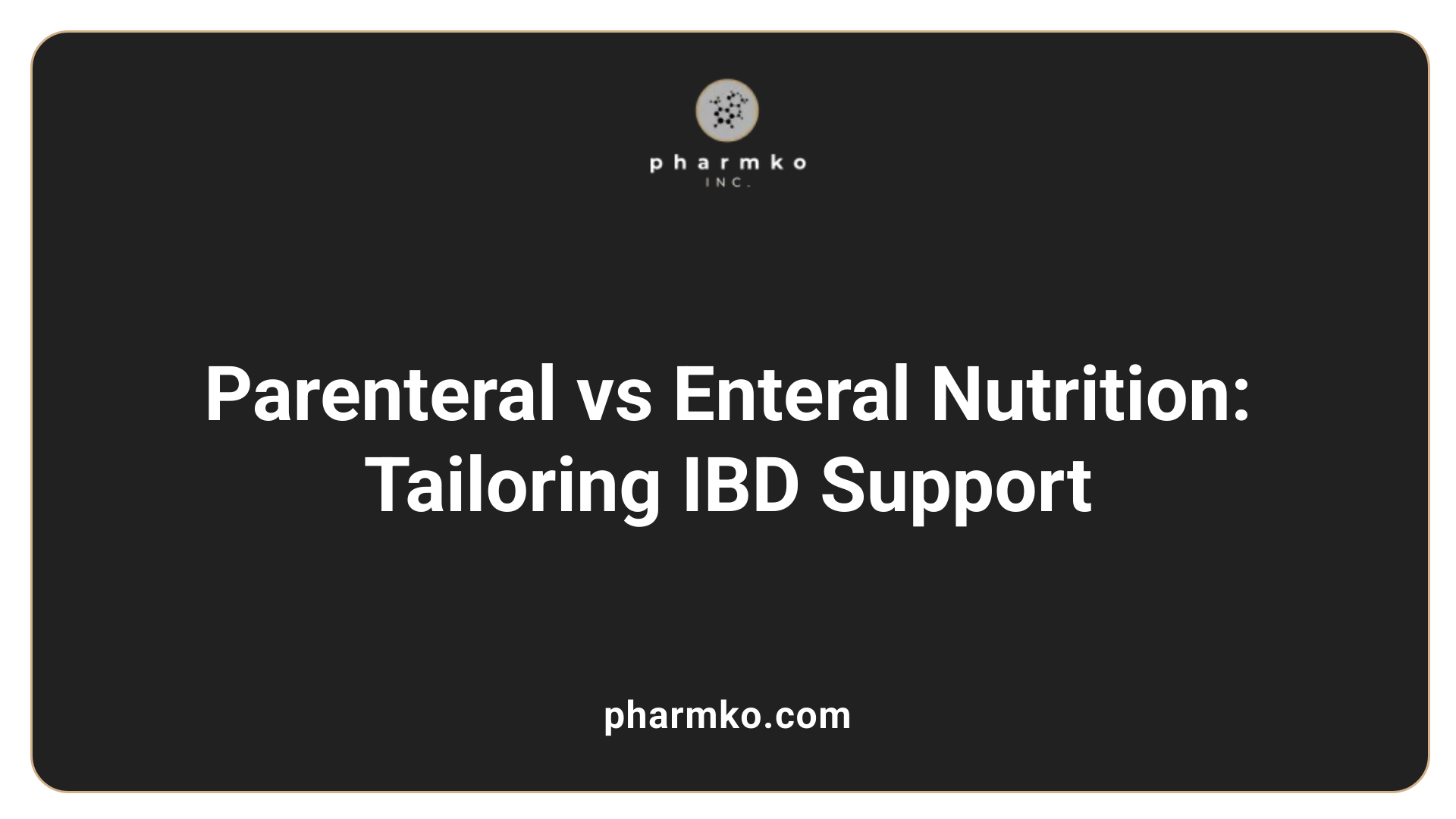
How does the role of parenteral nutrition compare to enteral nutrition in the management of IBD?
In managing inflammatory bowel disease (IBD), nutrition support plays a vital role, with choices largely depending on the patient's disease state and gastrointestinal (GI) tract functionality.
Enteral nutrition (EN), which involves feeding directly into the GI tract through oral intake or feeding tubes, is generally preferred over parenteral nutrition (PN). This is because EN supports the integrity of the gut mucosa, helps maintain normal gut flora, and reduces the risk of complications such as infections. EN has demonstrated efficacy in inducing remission, especially in pediatric Crohn's disease, and is associated with fewer adverse effects.
Parenteral nutrition, specifically total parenteral nutrition (TPN), involves delivering nutrients directly into the bloodstream, bypassing the GI tract entirely. It becomes essential when the gut cannot be used due to severe obstruction, fistulas, or intolerance. TPN is particularly valuable in correcting nutritional deficiencies, supporting wound healing, and providing bowel rest in cases of critical illness or complicated disease. However, TPN carries risks like bloodstream infections, catheter-related complications, and metabolic disturbances.
Overall, when the gastrointestinal tract is functional, EN is the first-line strategy due to its physiological benefits and lower complication profile. TPN is reserved for specific situations where EN is contraindicated or ineffective.
The decision on which nutrition support to use hinges on assessing the disease activity, presence of complications, and the patient's nutritional status. Both methods are crucial tools in the multidisciplinary management of IBD, ensuring nutritional needs are met while aiming to reduce disease progression and improve quality of life.
| Aspect | Enteral Nutrition (EN) | Parenteral Nutrition (PN) | Why Choose? |
|---|---|---|---|
| Supports gut health | Yes | No | Maintains intestinal mucosal function |
| Risk of infections | Lower | Higher | Due to catheter use in TPN |
| Uses | Mild to moderate disease, maintaining nutrition | Severe disease, bowel obstruction, fistulas, intolerance | Based on GI tract functionality |
| Indications | Induction of remission, nutritional support | Malnutrition correction, bowel rest, perioperative support | Disease severity and complications |
| Advantages | Fewer complications, supports gut microbiome | Essential when the gut is non-functional | When needed, lifesaving |
This tailored approach ensures optimal outcomes, balancing benefits and risks based on individual patient needs in IBD management.
Conclusion and Future Directions
Parenteral nutrition, principally TPN, remains a vital, though specialized, component of IBD management. It offers life-saving nutritional support in circumstances where enteral feeding is infeasible or contraindicated, such as severe bowel disease, fistulas, or postoperative recovery. While its benefits include correction of malnutrition, support for surgical outcomes, and temporary disease activity reduction, risks such as infections and metabolic complications necessitate meticulous management by multidisciplinary teams. Future research should focus on refining patient selection criteria, improving formulations to reduce complications, and integrating PN more seamlessly within personalized treatment strategies. As understanding of the microbiome and disease pathogenesis advances, nutritional therapies like PN will continue to evolve, fostering improved quality of life and clinical outcomes for patients with IBD.
References
- Parenteral Nutrition in Patients with Inflammatory Bowel Disease ...
- The role of total parenteral nutrition in inflammatory bowel disease
- Total parenteral nutrition in the management of inflammatory bowel ...
- Parenteral Nutrition, Inflammatory Bowel Disease, and Gut Barrier
- NUTRITION AND INFLAMMATORY BOWEL DISEASE - ScienceDirect
- An evaluation of total parenteral nutrition in the management of ...
- Nutritional approach as therapeutic manipulation in inflammatory ...
- [PDF] Nutritional Care in Adult Inflammatory Bowel Disease
- The use of parenteral nutrition in patients with inflammatory bowel ...













